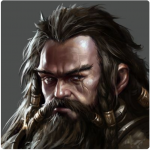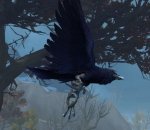G
Guest 11456
Guest
Players:
Deuce Traveler playing Michael Tell the Human Fighter
Kaodi playing Shendra the Human Oracle
Scotley playing Teodor Kirila the Human Rogue
Neurotic playing Drâth Isidar the Dwarven Druid
This is for the character sheets for my "Return of the Runelords" game.
IC
OOC
Deuce Traveler playing Michael Tell the Human Fighter
Kaodi playing Shendra the Human Oracle
Scotley playing Teodor Kirila the Human Rogue
Neurotic playing Drâth Isidar the Dwarven Druid
Paizo books are Core Rulebook, Advanced Class Guide, Advanced Player's Guide, Advanced Race Guide, Occult Adventures, Pathfinder Unchained, Ultimate Campaign, Ultimate Combat, Ultimate Equipment, Ultimate Magic, Pathfinder Player Companion: Champions of Corruption, Pathfinder Player Companion: Bastards of Golarion, Pathfinder Player Companion: Quests & Campaigns and Pathfinder Player Companion: Adventurer’s Armory 2.
Others possible. Just point me to them and I will make a determination.
Everyone gets three character tokens (henceforth tokens) to spend on any of the following when creating your character.
Step 1—Determine Ability Scores:
A. Free: 20 point buy
B. 1 token: 36 point buy
Step 2—Pick Your Race:
A. Free: Core Rulebook standard 7 (Dwarves, Elves, Gnomes, Half-Elves, Half-Orcs, Halflings, Humans).
B. 1 token: Any race from the Advanced Race Guide that is a Featured Race (Aasimars, Catfolk, Dhampirs, Drow, Fetchlings, Goblins, Hobgoblins, Ifrits, Kobolds, Orcs, Oreads, Ratfolk, Sylphs, Tengus, Tieflings, Undines).
Step 3—Pick Your Class:
A. Free: Core Rulebook standard 11 (Barbarian, Bard, Cleric, Druid, Fighter, Monk, Paladin, Ranger, Rogue, Sorcerer, Wizard)
B. 1 token: Other classes from Advanced Player's Guide, Anvanced Class Guide, Ultimate Combat, Ultimate Magic or Occult Adventures (Alchemist, Cavalier, Inquisitor, Oracle, Summoner, Witch, Arcanist, Bloodrage, Brawler, Hunter, Investigator, Shaman, Skald, Slayer, Swashbuckler, Warpriest, Gunslinger, Ninja, Samurai, Magus, Kineticist, Medium, Mesmerist, Occultist, Psychic, Spiritualist)
C. Pathfinder Unchained: If you choose one of the classes that has an unchained version you can pick either version (Barbarian, Monk, Rogue, Summoner).
Step 4—Select Skills:
A. Free: Core Rulebook skills.
B. 1 token: Background skill system from Pathfinder Unchained added.
Step 5—Select Feats:
A. Free: Core Rulebook feats.
B. 1 token: Include feats from other Paizo books.
Step 6—Buy Equipment:
A. Free: Equipment from Core Rulebook and Ultimate Equipment.
Step 7—Other stuff:
A. All players need to select one campaign trait from the Player's Guide.
B. All players need to select a second trait from any Paizo books.
C. Max gold for your class.
D. First level; max hit points for your class; any non-evil alignment.
Others possible. Just point me to them and I will make a determination.
Everyone gets three character tokens (henceforth tokens) to spend on any of the following when creating your character.
Step 1—Determine Ability Scores:
A. Free: 20 point buy
B. 1 token: 36 point buy
Step 2—Pick Your Race:
A. Free: Core Rulebook standard 7 (Dwarves, Elves, Gnomes, Half-Elves, Half-Orcs, Halflings, Humans).
B. 1 token: Any race from the Advanced Race Guide that is a Featured Race (Aasimars, Catfolk, Dhampirs, Drow, Fetchlings, Goblins, Hobgoblins, Ifrits, Kobolds, Orcs, Oreads, Ratfolk, Sylphs, Tengus, Tieflings, Undines).
Step 3—Pick Your Class:
A. Free: Core Rulebook standard 11 (Barbarian, Bard, Cleric, Druid, Fighter, Monk, Paladin, Ranger, Rogue, Sorcerer, Wizard)
B. 1 token: Other classes from Advanced Player's Guide, Anvanced Class Guide, Ultimate Combat, Ultimate Magic or Occult Adventures (Alchemist, Cavalier, Inquisitor, Oracle, Summoner, Witch, Arcanist, Bloodrage, Brawler, Hunter, Investigator, Shaman, Skald, Slayer, Swashbuckler, Warpriest, Gunslinger, Ninja, Samurai, Magus, Kineticist, Medium, Mesmerist, Occultist, Psychic, Spiritualist)
C. Pathfinder Unchained: If you choose one of the classes that has an unchained version you can pick either version (Barbarian, Monk, Rogue, Summoner).
Step 4—Select Skills:
A. Free: Core Rulebook skills.
B. 1 token: Background skill system from Pathfinder Unchained added.
Step 5—Select Feats:
A. Free: Core Rulebook feats.
B. 1 token: Include feats from other Paizo books.
Step 6—Buy Equipment:
A. Free: Equipment from Core Rulebook and Ultimate Equipment.
Step 7—Other stuff:
A. All players need to select one campaign trait from the Player's Guide.
B. All players need to select a second trait from any Paizo books.
C. Max gold for your class.
D. First level; max hit points for your class; any non-evil alignment.
The Return of the Runelords Adventure Path follows the PCs from humble beginnings in the haunted town of Roderic’s Cove to an epic confrontation for the future of Varisia itself. The PCs should know each other and should begin in Roderic’s Cove; beyond that, your character’s history is up to you to decide.
The campaign assumes that each PC begins with one of the following campaign traits. In addition to giving you a minor boon for your character, these traits will also help to establish why your character is destined to take the role of one of Varisia’s newest heroes. In addition, these traits link to additional events that unfold as the adventure path progresses, and may unlock additional and unanticipated opportunities down the road. Your GM will have information about these opportunities as they present themselves in the adventures.
The campaign assumes that each PC begins with one of the following campaign traits. In addition to giving you a minor boon for your character, these traits will also help to establish why your character is destined to take the role of one of Varisia’s newest heroes. In addition, these traits link to additional events that unfold as the adventure path progresses, and may unlock additional and unanticipated opportunities down the road. Your GM will have information about these opportunities as they present themselves in the adventures.
Kaodi
Adventuring has been in your blood for as long as you can remember, and this urge to go out and explore the world left you recently in over your head when you (foolishly or bravely, depending on how you look at it) decided to explore an old Thassilonian ruin near your home town. The adventure ended in tragedy when you set off a devastating trap while investigating a statue of a beautiful woman—someone you believed to be one of the ancient runelords of Thassilon. The trap slaughtered your entire party—including you.
You woke from death some time later, your memories intact but your body transformed. No longer did you resemble your previous self—you instead looked like the woman depicted in the statue. Now, you’ve joined up with a new group of adventurers; despite your tragic first attempt at dungeon delving, your thirst for adventure has returned stronger than ever. You’re sure that this time you’ll be able to keep your fellow explorers alive, and the strange dreams you’ve been having ever since you came back to life in your new body—a body that your research has revealed was originally intended to be a clone of none other than Sorshen, the Runelord of Lust—have only further solidified in your mind the fact that you and your companions are destined for greatness.
Your character must be human if you take this trait. Your ethnicity is Azlanti, but you are not pure-blooded—you have the standard human ability score adjustments. Your resemblance to Sorshen may have unexpected side effects as the campaign progresses, for good or for ill. In any event, you gain a +1 trait bonus on Bluff and Diplomacy checks, and these skills are always class skills for you.
Once per adventure, you can retroactively apply a +20 trait bonus to a saving throw against a mind-affecting effect after you learn the outcome of the roll. A saving throw result of a natural 1 still automatically fails, but if the +20 bonus adjusts the save so that it is successful, you treat the failed saving throw as a successful one.
Adventuring has been in your blood for as long as you can remember, and this urge to go out and explore the world left you recently in over your head when you (foolishly or bravely, depending on how you look at it) decided to explore an old Thassilonian ruin near your home town. The adventure ended in tragedy when you set off a devastating trap while investigating a statue of a beautiful woman—someone you believed to be one of the ancient runelords of Thassilon. The trap slaughtered your entire party—including you.
You woke from death some time later, your memories intact but your body transformed. No longer did you resemble your previous self—you instead looked like the woman depicted in the statue. Now, you’ve joined up with a new group of adventurers; despite your tragic first attempt at dungeon delving, your thirst for adventure has returned stronger than ever. You’re sure that this time you’ll be able to keep your fellow explorers alive, and the strange dreams you’ve been having ever since you came back to life in your new body—a body that your research has revealed was originally intended to be a clone of none other than Sorshen, the Runelord of Lust—have only further solidified in your mind the fact that you and your companions are destined for greatness.
Your character must be human if you take this trait. Your ethnicity is Azlanti, but you are not pure-blooded—you have the standard human ability score adjustments. Your resemblance to Sorshen may have unexpected side effects as the campaign progresses, for good or for ill. In any event, you gain a +1 trait bonus on Bluff and Diplomacy checks, and these skills are always class skills for you.
Once per adventure, you can retroactively apply a +20 trait bonus to a saving throw against a mind-affecting effect after you learn the outcome of the roll. A saving throw result of a natural 1 still automatically fails, but if the +20 bonus adjusts the save so that it is successful, you treat the failed saving throw as a successful one.
While every PC should be at least passingly familiar with the elven gravedigger Audrahni, you are one of the few in town she counts as a true friend. Work with the GM to determine what sort of common ground you and Audrahni share. Perhaps you worship a deity whose teachings parallel her vocation (such as Ashava or Pharasma). Maybe you’re a Forlorn elf and you sense a kindred spirit within her. With the GM’s permission you may have known her in Magnimar before meeting her once again upon arriving in Roderic’s Cove. Or perhaps you merely share a similar passion for arcana, dancing, history, magic, or religion. More details about Audrahni appear in the adventures, but she’s a mysterious woman who’s close lipped about her past—and so you’ll need to work with your GM to have a stronger relationship at the campaign’s outset. Audrahni trusts you, and she’s shared one element of her past with you since befriending you. Choose one of the following questions. At the start of the campaign, the GM will give you a brief answer about Audrahni’s past. Once you know the answer, you should fashion a parallel event in your own PC’s history, creating a shared misery or memory with Audrahni. The fact that you’ve met someone else who had a similar event in their past has bolstered your own resolve, and has granted you a +1 trait bonus to the saving throw determined by the question you select. “What happened to your parents?”: Grants a +1 trait bonus to Fortitude saving throws. “Where did you grow up?”: Grants a +1 trait bonus to Reflex saving throws. “What historical figure inspired you the most?”: Grants a +1 trait bonus to Will saving throws. Once per adventure as a standard action, you may concentrate on the bond you and Audrahni share. The strong emotions brought on by these memories bolster your desire to forge ahead and remain alive, granting you the effects of one of the following spells at a caster level equal to your character level: calm emotions, cure moderate wounds, or lesser restoration.
Binder Fred & Deuce Traveler
You and another PC are close allies—relatives. Work with the other player to build a shared history—both you and the other player must choose Close Allies as a campaign trait, and both must agree to the nature of the relationship between the two characters. You and your close ally have always supported each other. You might have the tendency to complete each other’s sentences, dress similarly, share the same religion or faith, or have endured a dangerous event together in the past.
Whenever you are adjacent to your close ally, you gain a +1 trait bonus on all saving throws.
Once per adventure as an immediate action, you may grant your close ally a bonus equal to the result of 1d6 to a single d20 roll. You must have line of sight to your ally to use this ability. You may choose to grant this bonus after your ally has rolled, but must do so before the result of the roll is known.
You and another PC are close allies—relatives. Work with the other player to build a shared history—both you and the other player must choose Close Allies as a campaign trait, and both must agree to the nature of the relationship between the two characters. You and your close ally have always supported each other. You might have the tendency to complete each other’s sentences, dress similarly, share the same religion or faith, or have endured a dangerous event together in the past.
Whenever you are adjacent to your close ally, you gain a +1 trait bonus on all saving throws.
Once per adventure as an immediate action, you may grant your close ally a bonus equal to the result of 1d6 to a single d20 roll. You must have line of sight to your ally to use this ability. You may choose to grant this bonus after your ally has rolled, but must do so before the result of the roll is known.
Shayuri
The rediscovery of Thassilon’s legacy several years ago was an eye-opener for many, including you. After living so long in the shadow of these enormous ruins, you were intrigued to find out that they were much older than anyone could have guessed and that the runelords who built them may still exist. You’ve made a promise to yourself to uncover all that you can about Thassilon, its runelords, and the mysterious history of that ancient civilization.
You gain Thassilonian as a bonus language, and at 1st level and every 2 levels thereafter, you gain a bonus skill rank that can only be applied to Knowledge (arcana), Knowledge (history), Linguistics, or Use Magic Device.
Once per adventure, you may either take 20 on a Use Magic Device check or activate a charged magic item without expending any charges.
The rediscovery of Thassilon’s legacy several years ago was an eye-opener for many, including you. After living so long in the shadow of these enormous ruins, you were intrigued to find out that they were much older than anyone could have guessed and that the runelords who built them may still exist. You’ve made a promise to yourself to uncover all that you can about Thassilon, its runelords, and the mysterious history of that ancient civilization.
You gain Thassilonian as a bonus language, and at 1st level and every 2 levels thereafter, you gain a bonus skill rank that can only be applied to Knowledge (arcana), Knowledge (history), Linguistics, or Use Magic Device.
Once per adventure, you may either take 20 on a Use Magic Device check or activate a charged magic item without expending any charges.
Your character has a personal link or association with one of Varisia’s established heroes. This hero should be a PC you played in a previous campaign (and could be, but need not be, one of the Sihedron Heroes). Your character could be a younger sibling, younger cousin, or even an apprentice of the hero. If enough time has passed, you might be the hero’s child, or your character could have reincarnated from the soul of a hero that died before your character was born. Choose two skills for which your associated hero has skill ranks. You gain a +1 trait bonus on checks with both of those skills, and those two skills are class skills for you. Once per adventure as a free action, you can call upon a previously forgotten bit of advice or lore imparted to you by the hero to gain an insight bonus equal to your class level (minimum +10) to a skill check. You may choose to apply this bonus after you roll the skill check, but must do so before the result of the roll is known.
As a child, you were influenced by overwhelming emotional trauma associated with death or undeath, and that influence marked you for the rest of your life. You may have been possessed by a ghost, had strange dreams in a haunted house, or suffered from an affliction from an undead source. You might even have had a near-death experience, or actually died and been returned to life. Work with your GM to determine the details of how you became spirit touched; she may have suggestions for you to tie your experience more tightly into the themes of the Return of the Runelords Adventure Path. You gain a +2 trait bonus on all saving throws made against supernatural attacks, spells, or spell-like abilities from undead creatures. Once per adventure, you may automatically succeed at a Constitution check to stabilize or a saving throw to remove a negative level.
Scotley
You’ve always felt separated from the era into which you were born. Perhaps you feel that you were born too late, and that you and your interests are better suited to a previous age. Maybe you have the conviction you were born too soon, and that your true destiny lies in some distant future. You might be suffering from missing time—whether a few hours, a few weeks, or even several months—for which you have no memories. You might instead receive brief visions of friends or enemies much older or younger than their actual age. You’ve long since grown used to this strange condition, but have not yet determined why you suffer from it. Your GM will be provided with additional information about this trait’s strange nature in the third adventure of Return of the Runelords.
You have a knack for knowing when to act a few instants in advance and gain a +2 trait bonus on Initiative checks.
Once per adventure as an immediate action, you may use your strange link to the flow of time to force the GM to reroll a single d20 roll. You must declare the use of this ability immediately after the GM rolls the d20, but you can choose to do so after learning the results of the roll.
You’ve always felt separated from the era into which you were born. Perhaps you feel that you were born too late, and that you and your interests are better suited to a previous age. Maybe you have the conviction you were born too soon, and that your true destiny lies in some distant future. You might be suffering from missing time—whether a few hours, a few weeks, or even several months—for which you have no memories. You might instead receive brief visions of friends or enemies much older or younger than their actual age. You’ve long since grown used to this strange condition, but have not yet determined why you suffer from it. Your GM will be provided with additional information about this trait’s strange nature in the third adventure of Return of the Runelords.
You have a knack for knowing when to act a few instants in advance and gain a +2 trait bonus on Initiative checks.
Once per adventure as an immediate action, you may use your strange link to the flow of time to force the GM to reroll a single d20 roll. You must declare the use of this ability immediately after the GM rolls the d20, but you can choose to do so after learning the results of the roll.
IC
OOC
Last edited by a moderator:









